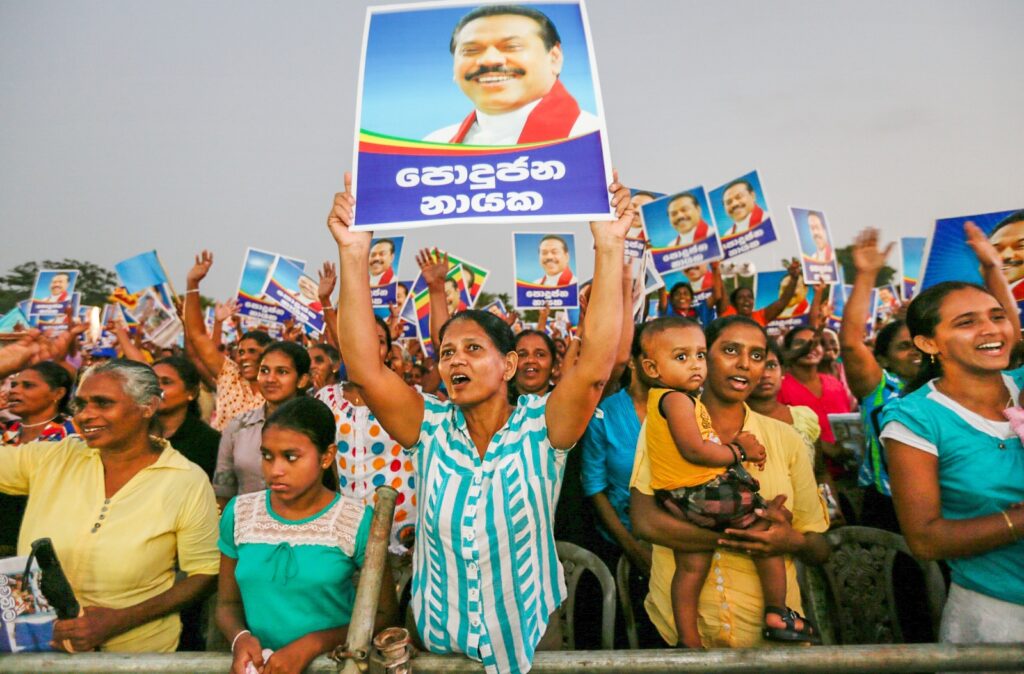Despite receiving little public attention, the tiny island of Sri Lanka has been plagued by ethnic turmoil and tumultuous politics over the last several decades. The country had just begun to rebuild itself after exiting a 26-year long ethnic conflict when a large-scale terrorist suicide bombing occurred on Easter Sunday in 2019, killing 269 people and reinvigorating ethnic and religious tensions. The tragedy made global headlines, but the attention was short-lived. Now, the election of a new administration poses several dangers to minority communities and national democracy. Consequently, the need for intervention from the international community grows.
Parliamentary elections were held in August after two pandemic-related delays. Approximately 71% of voters participated in the election and overwhelmingly voted for the Sri Lanka Podujana Peramuna (SLPP). This party is led by Mahinda and Gotabaya Rajapaksa, two brothers who have long been involved in Sri Lankan far-right politics. The SLPP won 145 seats out of the 225-member Parliament while their main opposition, the Samagi Jana Balawegaya (SJB), won only 54 seats. The SLPP is an offshoot of the previously powerful Sri Lankan Freedom Party, and the SJB originates from the older United National Party. Both of these traditional parties only received one seat in Parliament each, suggesting that the public is now eager to deviate from customary politics.
Several of the remaining 24 seats were taken by parties allied with the SLPP, giving the SLPP, and therefore the Rajapaksa brothers, control over Parliament for the next five years. This comes nearly a year after the election of Gotobaya Rajapaksa as president in 2019. His brother, Mahinda Rajapaksa, was appointed the prime minister again in August after serving the previous term.
The History of the Rajapaksas: Conflict, Division, and Monopoly
The Rajapaksa brothers have long captivated Sri Lankan politics and been ambassadors of the populist movement to uphold a Sinhalese Buddhist-controlled government. In 2019, Gotabaya Rajapaksa campaigned with the election slogan “One Country, One Law,” implicitly rejecting the notion of power-sharing with minority Tamil and Muslim communities. Mahinda Rajapaksa served as the president of Sri Lanka from 2005 to 2015 and led the government to victory over minority ethnic Tamils in a 26-year long civil war.
This ethnic conflict began as a result of tensions between Tamils and the majority Sinhalese-Buddhist population. Tamils had long argued that they had been systematically marginalized by the Sri Lankan government since the country’s independence in 1948. In 1983, the Tamil Tiger rebels killed 13 soldiers, triggering anti-Tamil riots that started a civil war with a death toll of over 100,000 civilians. In the final violent stages of the war, the government murdered 70,000 innocent Tamil civilians.
While Mahinda Rajapaksa was president during this time period, his brother and current president Gotabaya Rajapaksa led military operations as the defense secretary. The United Nations directly accused Gotabaya of ordering the military to commit war crimes during the war. Gotabaya has shown his disregard for these serious allegations multiple times. Only a few months after his election, the president withdrew from a 2015 UN Human Rights Council resolution that required the country to investigate allegations of human rights abuses and international law violations. In March of this year, Gotabaya pardoned a soldier sentenced to death for killing 8 innocent Tamil civilians, including 3 children, during the civil war.
Furthermore, the Rajapaksa brothers have a history of stifling dissent, nepotism, and manipulating the law to increase their political power. During his 2010 presidency, Mahinda added the 18th Amendment to the country’s constitution, resulting in an expansion of presidential power. The amendment removed the two-term presidential limit and withdrew the requirement for presidents to seek approval from the Constitutional Council before appointing judicial positions and heads of independent commissions.
As a result, loyalists to the SJPP, including direct relatives, became the head of independent commissions. This allowed the Rajapaksa brothers to indirectly influence decisions related to public services and election conduct. The defeat of Mahinda in 2015 largely occurred as a result of protests from minority groups and complaints of economic failure.
Last Year’s Glaring Warning Signs
However, the power of the Rajapaksa regime has once again been solidified with the results of the 2019 and 2020 elections. Their resurgence in popularity is due to weariness with political infighting and economic instability under the power of traditional parties. However, despite their popularity, political analysts and minority group leaders are concerned that SLPP will pave the way for eventual militaristic rule and disenfranchisement of Tamil and Muslim minorities.
Since the beginning of his presidency in 2019, Gotabaya has appointed several retired military officers to different civilian administration positions. Former officials have been placed in charge of the Ministry of Law and Order, the Ministry of Human Resources and the Ministry of Finance. With the onset of the COVID-19 pandemic, the Ministry of Health was also placed under the charge of a military official. Predictably, the Sri Lankan pandemic response, while praised internationally, has been characterized by heavy surveillance and strict police enforcement. In addition, Gotabaya has placed the Ministry of Defense in control of 37 government agencies, including the police and the secretariat for non-governmental organizations. Gotabaya has simultaneously stalled in appointing a Minister of Defense, which places him in de facto charge of the Ministry and allows him to make military decisions unchecked.
The Gotabaya administration has also attacked the minority Muslim community as tensions within the country have worsened after the Easter terrorist attacks. With reports of militaristic witch hunts and threats against Muslim activists, many Muslims are concerned about the repercussions of the Rajapaksas’ rule. On September 29, the government announced a ban on cattle slaughter in a political attempt to satisfy the majority Sinhalese Buddhist communities. This legislation especially impacts the mostly Muslim-owned slaughterhouses and beef stalls.
Authoritarianism Under the Rajapaksa Dynasty
Now, with a majority in the Parliament and both brothers occupying the government’s two most powerful positions, the SLPP has the power to propel the country towards authoritarianism. The Rajapaksa brothers are currently pushing for a rewrite of the 19th Amendment, which was passed after Mahinda was unseated as president in 2015. This amendment was created with the purpose of decreasing executive power, a move that the brothers aim to reverse. The Rajapaksas also aim to abolish the 13th Amendment that provided autonomy for provinces and encouraged power-sharing with different minority groups.
In another extreme move, the SLPP proposed a 20th amendment that allows Gotabaya to control ministries, have total power in appointing ministers and public service leaders, and be immune against possible prosecution. A particular clause that removes the ban on dual citizens in public office has been criticized heavily. This move will further empower the Rajapaksa family by paving the way for appointment of several relatives with dual citizenship.
Several petitions were filed to include a public referendum to vote on the amendment, with the Supreme Court agreeing that certain clauses in the amendment required public approval. However, revisions were made to remove these clauses and the 20th amendment was passed on October 22 with 65 legislators voting against it.
Making Amends for the Past
Sri Lankan political analysts and leaders within the Tamil and Muslim communities warn that these moves by the nationalist Rajapaksa brothers could worsen the relations between majority and minority communities. The Tamil Guardian, a news organization dedicated to ethnic Tamil affairs, has published several scathing pieces on the danger of the Rajapaksas. The recent actions of the brothers have also spurred criticism from major human rights organizations such as the UN as well as allies including the United States and India.
However, the empty condemnations from these international actors have not been paired with substantive action or threats that could alter Sri Lanka’s path. In addition, these countries and the UN in particular have drawn criticism in the past for their failures to protect innocent Sri Lankan civilians during the ethnic war.
An internal report released by the UN revealed the failures of senior UN staff located in Sri Lanka to adequately respond to the ongoing crisis. In particular, the withdrawal of UN staff from the country in 2008 was criticized as a move that allowed the government to carry out human rights violations without witness. This same report called out the lack of international publicity for this crisis. Former UN official Edward Mortimer pointed out the political motives behind the difference in reaction to the Libyan civil war, stating that “it didn’t get publicity like in Libya… Sri Lanka doesn’t have much oil and isn’t situated on the Mediterranean.”
Moving forward, ethnic division and extreme nationalism will continue to foment in Sri Lanka unless the international community takes an active role in condemning the anti-democratic actions of the Rajapaksa brothers. The past failures of international players led to the ethnic genocide and fragmentation of the Tamil population and have now allowed tyrannical rule to creep into Sri Lanka unchecked. The same rhetoric and rulers have recovered to full power, refueled by growing nationalist sentiment and recent events, including the Easter attacks.
Now, the international community needs to pay attention to the outcomes of this monumental election season. Most importantly, they need to work to preserve democracy in Sri Lanka with the same vigor and scrutiny given to foreign issues they have a vested interest in.







